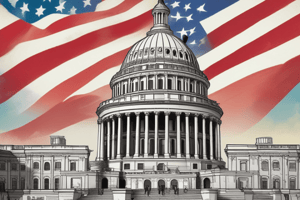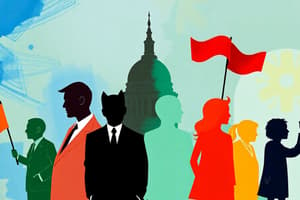Podcast
Questions and Answers
Which of the following is NOT explicitly mentioned as a reason for favoring democracy?
Which of the following is NOT explicitly mentioned as a reason for favoring democracy?
- It promotes equality among citizens.
- It enhances the dignity of the individual.
- It provides a method to resolve conflicts.
- It guarantees economic prosperity for all. (correct)
What is a common feature of democratic nations around the world?
What is a common feature of democratic nations around the world?
- Similar economic achievements
- Formal constitutions (correct)
- Identical social situations
- Uniform cultures
Why might students favour a classroom environment where conclusions are not dictated?
Why might students favour a classroom environment where conclusions are not dictated?
- It ensures everyone reaches the same conclusions.
- It leads to faster learning of facts.
- It promotes independent thought and exploration. (correct)
- It discourages critical thinking.
Which aspect of democratic decision-making is highlighted as a strength?
Which aspect of democratic decision-making is highlighted as a strength?
Considering the variety of democracies globally, what can be inferred about the ideal form of democracy?
Considering the variety of democracies globally, what can be inferred about the ideal form of democracy?
What does the text imply about the relationship between democracy and the correction of mistakes?
What does the text imply about the relationship between democracy and the correction of mistakes?
Why are formal constitutions important in countries that claim to be practicing some kind of democratic politics?
Why are formal constitutions important in countries that claim to be practicing some kind of democratic politics?
Which characteristic is most essential for a government to be considered truly democratic?
Which characteristic is most essential for a government to be considered truly democratic?
Transparency in a democratic government primarily ensures what outcome for citizens?
Transparency in a democratic government primarily ensures what outcome for citizens?
What is a potential trade-off of democratic decision-making due to its emphasis on deliberation and negotiation?
What is a potential trade-off of democratic decision-making due to its emphasis on deliberation and negotiation?
In what way might a non-democratic government be perceived as more efficient than a democratic one?
In what way might a non-democratic government be perceived as more efficient than a democratic one?
What role do norms and procedures play in ensuring the effectiveness of a democratic government?
What role do norms and procedures play in ensuring the effectiveness of a democratic government?
Why is citizen participation in decision-making considered important in a democracy?
Why is citizen participation in decision-making considered important in a democracy?
Which of the following is most opposite to the concept of transparency in governance?
Which of the following is most opposite to the concept of transparency in governance?
What might be a valid criticism against democracies in terms of governmental efficiency?
What might be a valid criticism against democracies in terms of governmental efficiency?
How does a democratic government's responsiveness to the expectations of its citizens impact its overall legitimacy?
How does a democratic government's responsiveness to the expectations of its citizens impact its overall legitimacy?
Based on the survey data, which South Asian country exhibits the lowest percentage of citizens who believe democracy is preferable to other forms of government?
Based on the survey data, which South Asian country exhibits the lowest percentage of citizens who believe democracy is preferable to other forms of government?
Which South Asian nation has the highest percentage of respondents who find dictatorship preferable to democracy or who believe it doesn't matter?
Which South Asian nation has the highest percentage of respondents who find dictatorship preferable to democracy or who believe it doesn't matter?
According to the survey, which country displays the greatest degree of support for leaders elected by the people?
According to the survey, which country displays the greatest degree of support for leaders elected by the people?
Which of the following can be inferred from the survey data regarding democratic values in South Asia?
Which of the following can be inferred from the survey data regarding democratic values in South Asia?
Based on the data, which country has the smallest gap between those who 'strongly agree' and 'agree' that democracy is preferable?
Based on the data, which country has the smallest gap between those who 'strongly agree' and 'agree' that democracy is preferable?
The survey suggests a correlation between democratic preference and support for elected leaders. Which country's data most strongly challenges a direct, one-to-one relationship between these two measures?
The survey suggests a correlation between democratic preference and support for elected leaders. Which country's data most strongly challenges a direct, one-to-one relationship between these two measures?
Assuming a country's stability is directly proportional to its citizens' preference for democracy, which country is most likely to experience political instability?
Assuming a country's stability is directly proportional to its citizens' preference for democracy, which country is most likely to experience political instability?
If a policy advisor were to use this data to advocate for democracy-building initiatives, in which country would they likely focus their efforts, and why?
If a policy advisor were to use this data to advocate for democracy-building initiatives, in which country would they likely focus their efforts, and why?
What is a valid conclusion based on the information provided?
What is a valid conclusion based on the information provided?
If a researcher aimed to understand the factors influencing democratic values in South Asia, which country would offer the most insightful case study, given the data?
If a researcher aimed to understand the factors influencing democratic values in South Asia, which country would offer the most insightful case study, given the data?
Based on the data, what tentative conclusion can be drawn about the relationship between dictatorial regimes and economic growth?
Based on the data, what tentative conclusion can be drawn about the relationship between dictatorial regimes and economic growth?
Table 2 indicates that within democratic countries, there are varying degrees of income inequality. Which statement best reflects this observation?
Table 2 indicates that within democratic countries, there are varying degrees of income inequality. Which statement best reflects this observation?
Consider countries like Denmark and South Africa, both democracies. Based on the data, what significant difference exists between them?
Consider countries like Denmark and South Africa, both democracies. Based on the data, what significant difference exists between them?
If a nation prioritizes both economic growth and equal distribution of wealth, which form of government, based solely on this data, would be the most reliable choice?
If a nation prioritizes both economic growth and equal distribution of wealth, which form of government, based solely on this data, would be the most reliable choice?
What critical factor does the cartoon highlight regarding the economic performance of democratic regimes?
What critical factor does the cartoon highlight regarding the economic performance of democratic regimes?
Based on the tables, which scenario would provide the least amount of information to determine whether a country should be a democracy or dictatorship?
Based on the tables, which scenario would provide the least amount of information to determine whether a country should be a democracy or dictatorship?
If a policymaker is trying to reduce income inequality within a democratic nation, which approach would be most directly supported by the data?
If a policymaker is trying to reduce income inequality within a democratic nation, which approach would be most directly supported by the data?
Imagine two countries, both initially poor. Country A adopts a dictatorial regime and experiences slightly faster economic growth. Country B adopts a democratic system. According to the text, what might be a potential disadvantage for Country A compared to Country B?
Imagine two countries, both initially poor. Country A adopts a dictatorial regime and experiences slightly faster economic growth. Country B adopts a democratic system. According to the text, what might be a potential disadvantage for Country A compared to Country B?
The evidence presented has several limitations. Which of the following is a significant limitation when evaluating the effectiveness of democracy versus dictatorship?
The evidence presented has several limitations. Which of the following is a significant limitation when evaluating the effectiveness of democracy versus dictatorship?
Given the data, what statement would most accurately reflect the complex relationship between political systems and economic outcomes?
Given the data, what statement would most accurately reflect the complex relationship between political systems and economic outcomes?
Why might democratically elected governments be perceived as not adequately addressing poverty?
Why might democratically elected governments be perceived as not adequately addressing poverty?
Given the information, how does the economic status of Bangladesh reflect on the outcomes of democracy in some nations?
Given the information, how does the economic status of Bangladesh reflect on the outcomes of democracy in some nations?
What can be inferred from the mention of poor nations depending on richer countries for food supplies?
What can be inferred from the mention of poor nations depending on richer countries for food supplies?
Considering the provided cartoons, what broader commentary is being made about global wealth distribution and its implications?
Considering the provided cartoons, what broader commentary is being made about global wealth distribution and its implications?
What underlying assumption is being made when it's stated that one would 'expect' democratically elected governments to address poverty?
What underlying assumption is being made when it's stated that one would 'expect' democratically elected governments to address poverty?
Flashcards
Democratic Politics Today
Democratic Politics Today
Many nations today assert and implement some form of democratic governance.
Formal Constitutions
Formal Constitutions
Documents outlining the structure and principles of a government, common in democracies.
Elections
Elections
A process carried out in democracies to elect leaders and representatives.
Political Parties
Political Parties
Signup and view all the flashcards
Citizens' Rights
Citizens' Rights
Signup and view all the flashcards
Equality in Democracies
Equality in Democracies
Signup and view all the flashcards
Practice of democracy
Practice of democracy
Signup and view all the flashcards
Democracy's Core Concern
Democracy's Core Concern
Signup and view all the flashcards
Citizen Participation
Citizen Participation
Signup and view all the flashcards
Accountable Government
Accountable Government
Signup and view all the flashcards
Norms and Procedures
Norms and Procedures
Signup and view all the flashcards
Transparency
Transparency
Signup and view all the flashcards
Deliberation and Negotiation
Deliberation and Negotiation
Signup and view all the flashcards
Democracy's Delay
Democracy's Delay
Signup and view all the flashcards
Transparency in Democracy
Transparency in Democracy
Signup and view all the flashcards
Access to Information
Access to Information
Signup and view all the flashcards
Poverty & Democracies
Poverty & Democracies
Signup and view all the flashcards
Poverty in Bangladesh
Poverty in Bangladesh
Signup and view all the flashcards
Dependency on Rich Countries
Dependency on Rich Countries
Signup and view all the flashcards
Wealth Distribution
Wealth Distribution
Signup and view all the flashcards
Definition of Poverty
Definition of Poverty
Signup and view all the flashcards
"Democracy is preferable" support in South Asia
"Democracy is preferable" support in South Asia
Signup and view all the flashcards
"Sometimes dictatorship is better" support in South Asia
"Sometimes dictatorship is better" support in South Asia
Signup and view all the flashcards
"Doesn't matter to me" support in South Asia
"Doesn't matter to me" support in South Asia
Signup and view all the flashcards
Overwhelming support for democracy
Overwhelming support for democracy
Signup and view all the flashcards
Those who agree with one of the statements
Those who agree with one of the statements
Signup and view all the flashcards
Expectations of Democracies
Expectations of Democracies
Signup and view all the flashcards
Factors in Economic Development
Factors in Economic Development
Signup and view all the flashcards
Democracies & Development
Democracies & Development
Signup and view all the flashcards
International Cooperation
International Cooperation
Signup and view all the flashcards
Economic Priorities
Economic Priorities
Signup and view all the flashcards
Economic Growth in Dictatorships
Economic Growth in Dictatorships
Signup and view all the flashcards
Economic Growth in Poor Countries
Economic Growth in Poor Countries
Signup and view all the flashcards
Income Distribution Extremes
Income Distribution Extremes
Signup and view all the flashcards
Variations in Democratic Equality
Variations in Democratic Equality
Signup and view all the flashcards
Unequal Opportunities
Unequal Opportunities
Signup and view all the flashcards
Economic Verdict on Democracy
Economic Verdict on Democracy
Signup and view all the flashcards
Inequality Examples
Inequality Examples
Signup and view all the flashcards
Equality Examples
Equality Examples
Signup and view all the flashcards
Study democracy
Study democracy
Signup and view all the flashcards
Study Notes
Outcomes of Democracy: Overview
- The chapter addresses what democracy does and what outcomes can be reasonably expected from it.
- It assesses the outcomes in quality of government, economic well-being, inequality, social differences, conflict resolution, freedom, and dignity.
Assessing Democracy's Outcomes
- Democracy is seen as better than dictatorship because it promotes equality, enhances individual dignity, improves decision-making quality, resolves conflicts, and allows for correcting mistakes.
- Despite general support for democracy, satisfaction with its practical application is lower, posing a dilemma of democracy being good in principle but not always in practice.
- Over a hundred countries practice some form of democratic politics, with variations in social situations, economic achievements, and cultures.
- It is important to recognize democracy as a form of government that creates conditions for achieving something, and citizens must take advantage of these conditions.
Accountable, Responsive, and Legitimate Government
- Democracy should ensure people have the right to choose their rulers and have control over them, with citizen participation in decision-making.
- The most basic outcome of democracy should be a government accountable to citizens and responsive to their needs.
- Non-democratic rulers can be quick and efficient in decision making without needing deliberation in assemblies or worrying about public opinion.
- Democratic governments take more time to follow procedures, but their decisions may be both more acceptable and more effective.
- Democracy ensures decision making is based on norms and procedures, and citizens have the right to examine the decision-making process, known as transparency.
- Democratic governments should develop mechanisms for citizens to hold the government accountable and participate in decision-making.
Democratic Ideals
- Democracies should have regular, free, and fair elections and open public debate on major policies.
- Democracies have had success in setting up regular and free elections and in setting up conditions for open public debate.
- Democracies often frustrate the needs of the people and ignore the demands of the majority, and the record of democracies is not impressive when it comes to being free of corruption.
- Democratic government is legitimate; a democratic government is the people's own government.
- There is overwhelming support for democracy worldwide, even in countries without democratic regimes.
Economic Growth and Development
- Evidence shows that many democracies did not fulfill economic development expectations.
- From 1950 to 2000, dictatorships had a slightly higher rate of economic growth, but this cannot be the only reason to reject democracy.
- Economic development depends on various factors, and the economic development difference between less developed countries with dictatorships and democracies is negligible.
- Democracy isn't a guarantee of economic development, but it is expected that democracy not lag behind dictatorships in this respect.
Economic Outcomes Of Democracy
- Arguments about democracy should be resolved by referring to facts and figures.
- On average, dictatorial regimes have had a slightly better record of economic growth, but in poor countries, there is virtually no difference.
- Within democracies, there can be high degrees of inequalities, in countries like South Africa and Brazil, the top 20 percent of people take away more than 60 percent of the national income.
Reduction of Inequality And Poverty
- It is reasonable to expect democracies to reduce economic disparities.
- Democracies are based on political equality, but economic inequalities are growing.
- Democracies do not appear to be very successful in reducing economic inequalities.
Accommodation of Social Diversity
- Democracies should produce a harmonious social life.
- Democracies usually develop procedures to conduct their competition, reducing the possibility of tensions becoming explosive or violent.
- There is a lesson to be learned to respect differences, and evolve negotiations.
- It is necessary to understand that democracy is not simply rule by majority opinion and majority and minority opinions are not permanent.
- Democracy means every citizen has a chance of being in majority at some point of time, and democratic rule ceases to be accommodative if someone is barred from being in majority on the basis of birth.
Dignity and Freedom of the Citizens
- Democracy stands superior to any other government form in promoting dignity and freedom of the individual.
- The world has recognized it, at least in principle.
- It's not simple to recognize that all individuals are equal across all backgrounds.
- The recognition that ordinary citizens value their democratic rights, as well as the criteria for judging any democratic country.
- What is most distinctive about democracy is that its examination never gets over.
- A public expression of dissatisfaction with democracy shows the success of the democratic project: it transforms people from the status of a subject into that of a citizen.
Studying That Suits You
Use AI to generate personalized quizzes and flashcards to suit your learning preferences.




